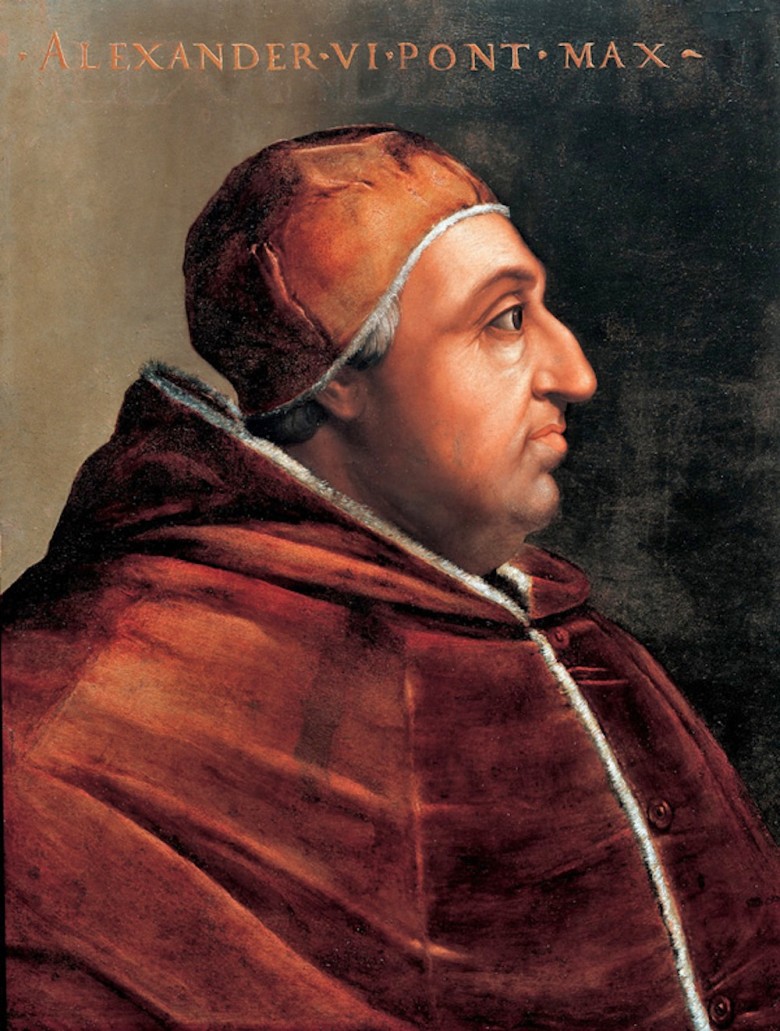 |
| Alexander VI, Poster Child of Bad Popes |
Popes are men of their times... and the
bad popes tell us something about the Church's ever-changing
relationship to society. In the early middle ages, influential Roman
families controlled the election of the Pope (unless a northern king
from, say, Germany, came down and put his own candidate on Peter's
Chair). Meanwhile the Vikings were devastating the monasteries that
could have been training grounds for scholarly and virtuous bishops
(and, possibly, popes). The lack of leadership from within opened the
way to exploitation by the powerful, and this continued off and on through the Renaissance. (A series of popes, including the most notorious, came
from just two Italian families, the Medici and the Borgia.) The
Church became a career path like any other; the Pope a “prince”
like any other with lands to defend and commerce to be conducted. Yet despite the financial and moral corruption of some of the successors of St. Peter, none of them ever promulgated false teachings or attempted to rewrite the moral laws they themselves flouted in their personal lives!
In one of the most challenging eras in
Church history, with European leaders in ever-changing alliances and
wars (and body counts to match), with Martin Luther's righteous
challenges as yet unanswered, two of the less admirable popes
succeeded one another. Clement VII (a Medici) was more interested in
continental politics than in the city of Rome, which was sacked on
his watch. His successor was
Paul
III, born Alexander Farnese. Through his sister, Farnese had ties to
the most infamous of Renaissance popes, the Borgia Alexander VI
(the married Julia was the pope's mistress). Farnese himself was a family man who
appointed two teenaged grandsons as Cardinals (he had separated from
his own mistress, the mother of his four children, before he was
ordained to the priesthood--and, to be fair, was not a wicked man).
 |
| The young St. Ignatius Loyola discovering the call of Christ. |
During
this same period, some of the greatest saints in history made their
mark: Francis Xavier, Teresa of Avila, Ignatius
of Loyola, Peter Favre, Philip Neri, John of the Cross, Cajetan,
Thomas More, John Fisher, Peter of Alcantera, Francis Borgia
(great-grandson of Pope Alexander). Could
it be that the weaker and more worldly the Pope, the greater the
saints of the age?
Most of the 8-10 generally recognized "bad popes" reigned between 880-1550. As Protestantism made the pope irrelevant to swaths of northern Europe and nation-states began to arise, the climate that had allowed for bad popes gradually changed. We haven't seen their like since.
When a pope is saintly, it could be
believed that he – and he alone – is responsible for the spread
of the Gospel. But no one can be tempted to shift all the
responsibility for the cause of the Gospel on men who are obviously
unfaithful to it! Then it becomes clear that the work of
evangelization truly rests on the shoulders of each and every member
of the Church. (Could the bad popes have been somehow good for the Church, after all?)
This is the third in a series of 7 Things Every Catholic Should Know about the Papacy.
#2 is The Bishop of Rome is the Pope, Not Vice-Versa
#1 is It Was Jesus' Idea to Build His Church on Peter

No comments:
Post a Comment